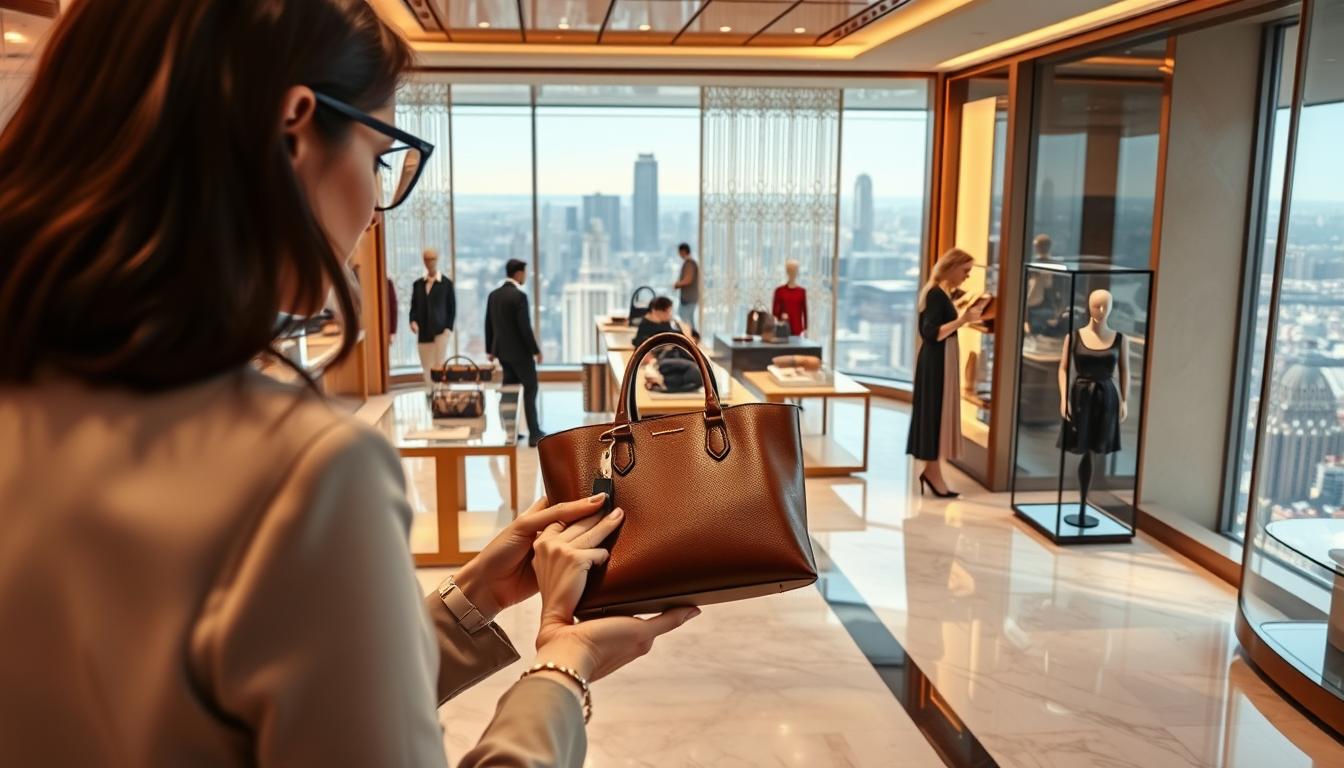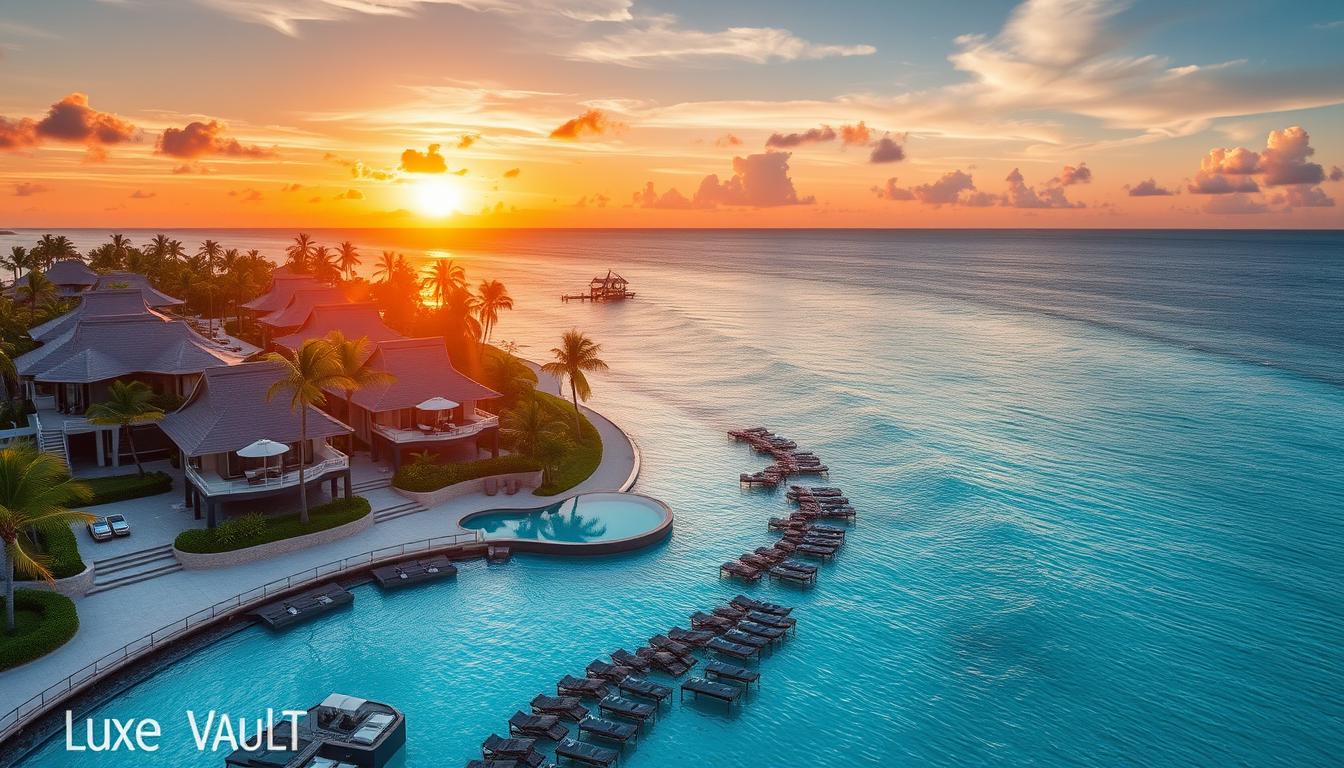Ever thought why you spend more on luxury items? It’s not just about quality or use. It’s the prestige and status they offer.
Luxury shopping is more than just buying things. It’s about the experience, feeling exclusive, and showing success. At Cowrit, we dive into luxury shopping behavior. We offer content and digital marketing to help brands reach this market.
Looking for content writing, marketing, or digital services? Reach out to raja@cowrit.com. We’ll show you how to boost your brand.
Key Takeaways
- Luxury shopping is driven by psychological factors beyond basic functionality.
- The prestige and status associated with luxury goods drive consumer behavior.
- Understanding luxury shopping behavior is key for brands.
- Good content marketing can connect brands with the luxury market.
- Digital marketing can make your brand stand out.
Understanding Luxury Shopping Behavior
Luxury goods have fascinated people for centuries. They are driven by both emotional and rational reasons. People are drawn to high-end clothing, designer handbags, luxury cars, and exclusive jewelry.
The Definition of Luxury
Luxury items are known for their high quality, exclusivity, and high prices. They are not just useful; they also show status, prestige, and personal joy. For example, a luxury handbag is more than a bag; it’s a sign of style and class.
Consumer Motivation for Luxury Goods
What makes people buy luxury goods? The reasons are complex, involving both emotional and social aspects. Some want to be part of an elite group. Others use luxury items to show their personal style. Owning a luxury watch, for instance, can show success and achievement.
The perceived value and craftsmanship of luxury brands also play a role. The fine details and quality materials make these items worth the high prices. This makes them valuable investments for many.
If you’re curious about luxury brands and their focus on exclusivity and aspiration, we can help. Or if you need services for content marketing and digital marketing, contact us at raja@cowrit.com for more details.
The Emotional Connection to Luxury Items
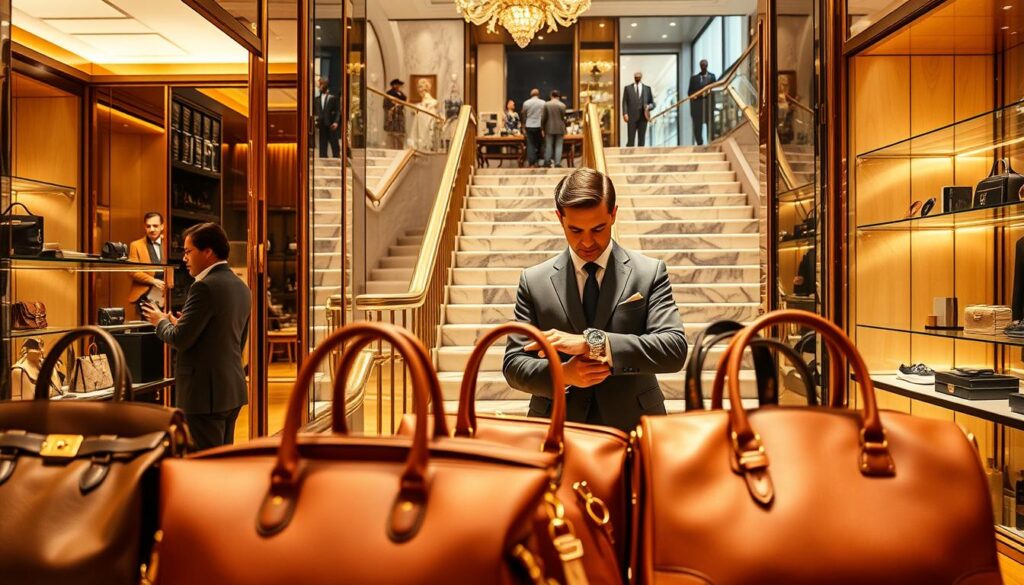
Luxury shopping is more than buying things. It’s about feeling like you belong to a special group. When you buy luxury items, you’re not just getting a product. You’re getting an emotional experience that connects you to a certain lifestyle or community.
A Sense of Belonging Through Luxury
Luxury brands make you feel exclusive. They make you think you’re part of a special group. This feeling of belonging is a big reason why people buy luxury items.
Brands like Gucci and Louis Vuitton create an exclusive aura. This aura makes customers feel a strong emotional connection. It’s a powerful way to connect with customers.
Luxury brands also offer personalized experiences. They provide tailored service and bespoke products. This makes customers feel special and builds a strong emotional bond.
The Role of Aesthetics in Purchase Decisions
The look of luxury products matters a lot. The design and craftsmanship show off your personal style and values. For example, Apple products and Tiffany & Co. jewelry are not just pretty. They also show status or taste.
The beauty of luxury items can make you feel strong emotions. This makes shopping more fun and memorable. Luxury brands spend a lot on making their products and stores look amazing. This not only gets you to buy but also keeps you loyal to the brand.
If you want to learn more about luxury shopping or need help with content marketing and digital marketing, contact us at raja@cowrit.com.
The Social Status Factor
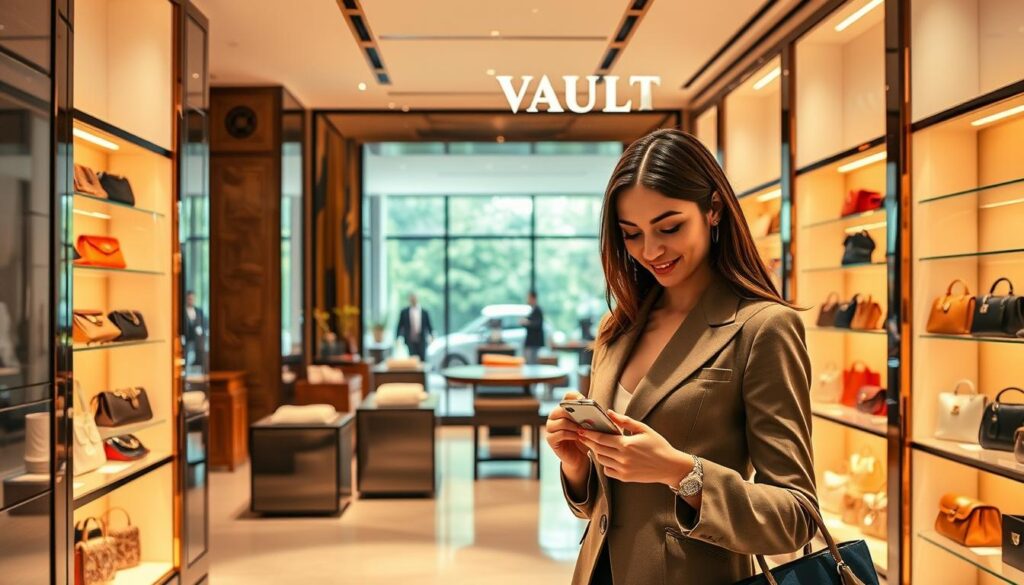
The love for luxury goods comes from our need for social recognition. You’re drawn to these items because they show your status in society.
Prestige and Identity Formation
Luxury goods are symbols of wealth and social standing. Buying them is like investing in a part of your identity. This identity is shaped by the prestige of luxury brands.
For example, owning a luxury watch or handbag shows your success and style. It’s a way to tell others you’ve reached a certain level of prosperity. So, your choices are influenced by how you want to be seen by others.
The Influence of Social Proof on Purchases
What your friends think can really sway your luxury buys. You choose brands that your idols or role models support.
If a celebrity you admire wears a certain brand, you might choose it too. Their endorsement makes the brand seem more prestigious and high-quality.
If you want to learn more about luxury brands and social status, or need help with content or digital marketing, contact raja@cowrit.com.
The Role of Marketing in Luxury Shopping
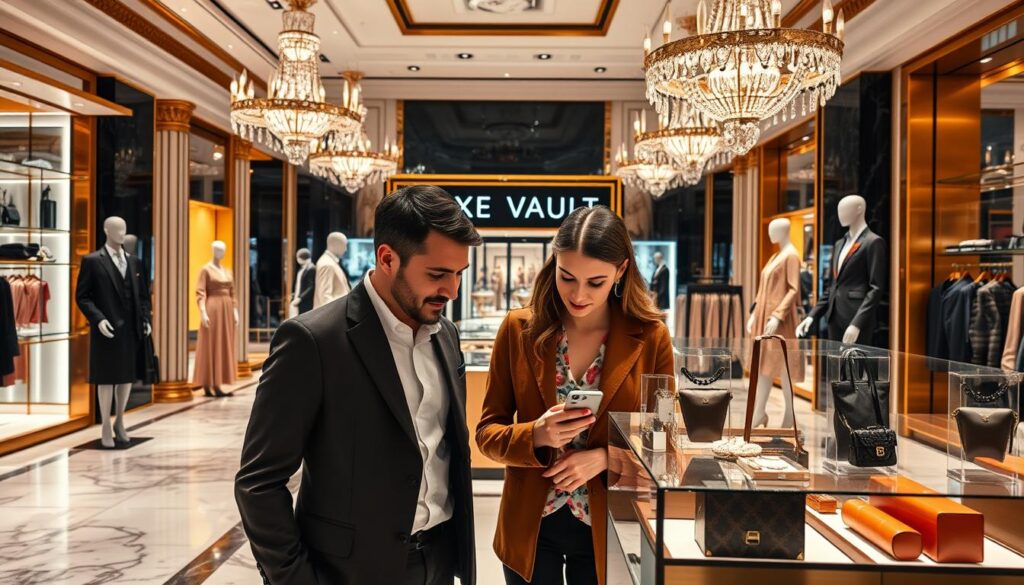
As a consumer, you’re drawn to luxury brands for their prestige and quality. They create emotional connections that go beyond their products. Marketing strategies are key in building these connections and driving spending.
Emotional Advertising and Luxury Brands
Luxury brands use emotional ads to connect with their audience’s desires. They show exclusivity, sophistication, and glamour to make their products more appealing. For example, a luxury car brand might show sleek designs and luxurious interiors to evoke freedom and status.
These ads don’t just sell products; they sell a lifestyle. Emotional advertising creates a deep connection with customers. It makes them feel seen, understood, and valued. When a brand resonates with your values, you’re more likely to buy from it.
The Power of Storytelling in Brand Perception
Storytelling is a powerful tool for luxury brands. They tell stories of heritage, craftsmanship, and exclusivity. This makes the brand more relatable and desirable. For instance, a luxury fashion brand might share the story of its founder, highlighting passion and dedication.
Effective storytelling in luxury marketing includes:
- Craftsmanship: Showing the skill and detail in luxury products.
- Heritage: Sharing the brand’s history and legacy.
- Exclusivity: Emphasizing the rarity and uniqueness of items.
By using these elements, luxury brands create compelling stories. You’re drawn to the brand for its values, history, and craftsmanship, not just its products.
For more on luxury marketing, contact us at raja@cowrit.com for resources and services.
The Psychology of Scarcity
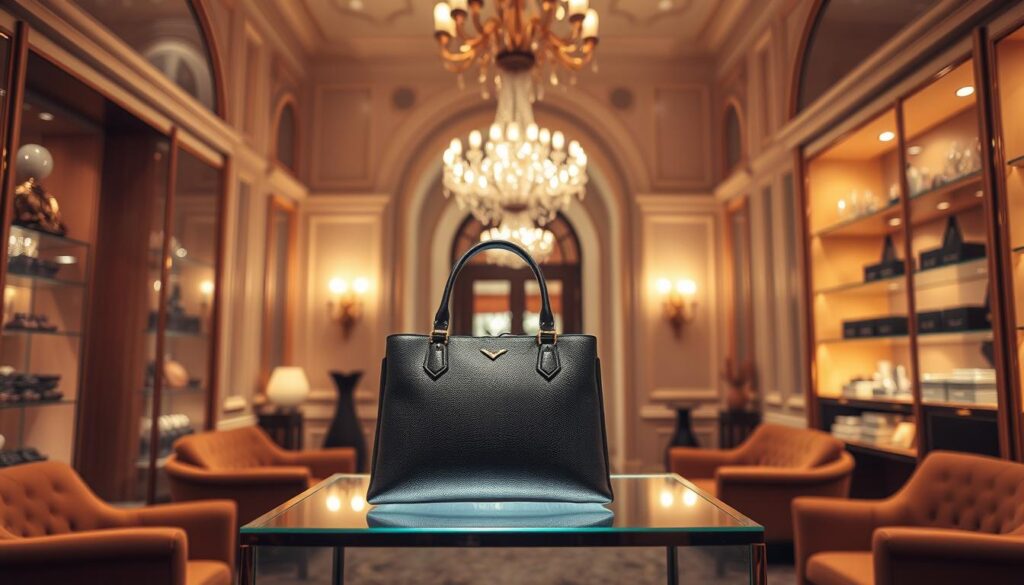
Luxury brands use the psychology of scarcity to make you feel like you must have their products. They tap into your desire for unique and rare items. This makes their luxury goods even more appealing.
Limited Editions and Exclusivity
Limited editions create a sense of exclusivity for luxury brands. Knowing a product is only available for a short time makes you want to buy it. This strategy not only increases sales but also boosts the brand’s prestige.
Some key aspects of limited editions include:
- Exclusivity: Limited editions make you feel part of a select group.
- Urgency: The limited availability prompts you to make quicker purchasing decisions.
- Uniqueness: Limited edition products are often perceived as more valuable or desirable.
Fear of Missing Out (FOMO) and Luxury Items
The fear of missing out, or FOMO, affects your decisions to buy luxury items. Luxury brands use this by making their products seem scarce. When you think a luxury item is rare, you want it more, fearing you might miss out.
FOMO can be triggered through various marketing strategies, including:
- Countdown timers on websites, indicating the limited time available to purchase a product.
- Social media campaigns that highlight the exclusivity and scarcity of a product.
- Limited production runs, making the product rare and more desirable.
By understanding the psychology of scarcity, luxury brands can create a sense of urgency and exclusivity. This makes their products more appealing.
For more information on how luxury brands use marketing strategies, contact us at raja@cowrit.com. We offer Content Writing, Content Marketing, and Digital Marketing services.
The Impact of Brand Heritage
Brand heritage is key in luxury shopping. It shows tradition, quality, and craftsmanship. When you think about buying luxury, the brand’s history matters a lot.
Tradition and Consumer Trust
The tradition of a luxury brand builds trust. A brand with a long history of quality is more trustworthy. Rolex and Louis Vuitton, for example, have been around for centuries.
Having a rich history means a brand is stable and reliable. This makes consumers willing to pay more for products from trusted brands.
Craftsmanship and Quality
Brand heritage also highlights craftsmanship and quality. Luxury brands focus on their heritage to show their commitment to quality. This justifies their high prices and attracts those who value legacy.
Key Aspects of Brand Heritage:
- Historical significance and legacy
- Commitment to quality and craftsmanship
- Established reputation and consumer trust
| Brand | Heritage | Impact on Consumer Trust |
|---|---|---|
| Rolex | Over 100 years of watchmaking excellence | High trust due to consistent quality |
| Louis Vuitton | Rich history in luxury luggage and fashion | Strong brand loyalty and trust |
| Gucci | Legacy in high-quality leather goods and fashion | High-end perception and consumer trust |
For luxury brands, keeping their heritage alive is vital. It keeps current customers and attracts new ones who value history and craftsmanship. If you want to learn more about luxury brands or need help with content or digital marketing, contact us at raja@cowrit.com.
Pricing Strategies in Luxury Markets
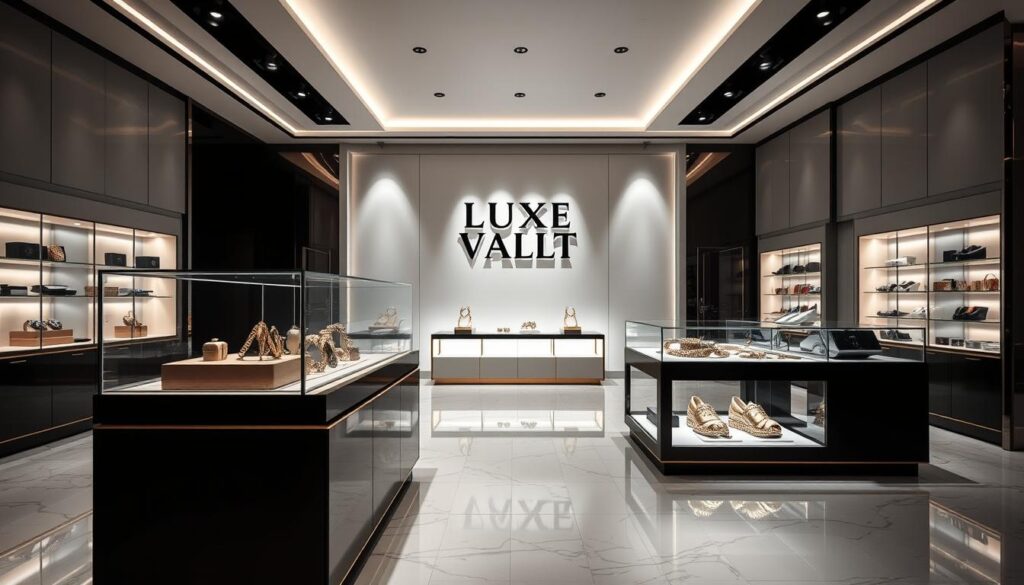
In the world of luxury goods, pricing is more than just covering costs. It’s about creating a sense of value. You often think that higher prices mean better quality and exclusivity. This is what luxury brands use when setting their prices.
Why Higher Prices Signal Quality
Higher prices can mean quality to you. They suggest the product is made with top materials, craftsmanship, or technology. Brands like Rolex or Louis Vuitton charge more, showing their excellence. For example, a study on luxury shows how high prices can sway your choices.
Seeing a high price can make you think the product is better, even if you don’t know much about it. This is because of the price-quality heuristic. The price acts as a sign of quality.
The Psychology of Price Anchoring
Price anchoring is a tactic used by luxury brands. They set a high initial price or compare their product to something even pricier. For instance, a $1,000 handbag might seem more affordable if shown next to a $2,000 one.
This method uses psychology to make you see value relative to something else. The more expensive item acts as an anchor, making the cheaper one seem like a better deal. Luxury brands use this to make you feel like you’re getting a special deal, encouraging you to buy.
For more information on our content marketing services, you can contact us at raja@cowrit.com.
The Influence of Social Media
Social media has a big impact on luxury shopping. It shapes what you want and like in high-end goods. On social media, you see a world of luxury, where brands show off their products in a way that makes you want them.
Influencers and Luxury Buying Decisions
Influencers are key in deciding what luxury items you buy. They work with luxury brands to show their products to many people. For example, a famous fashion influencer might team up with a designer to show off a new collection.
- Influencers make luxury brands seem more real and personal.
- They share behind-the-scenes stuff, showing how luxury goods are made.
- What they say about a brand can really change how you see it.
Need Content Writing | Content Marketing | Digital Marketing | Social Media Marketing and More services? Contact us at raja@cowrit.com.
The Role of Visual Content in Luxury Marketing
Visual content is key in luxury marketing on social media. Brands use top-notch images and videos to show off their products. This creates a deep experience for those who might buy them.
- High-quality images that show off the quality and work of luxury goods.
- Videos that tell the brand’s story, history, and product stories.
- Instagram Stories and Reels that give a special look at luxury brands.
By using visual content well, luxury brands can grab your attention, make you feel something, and push you to buy.
Personalization in Luxury Shopping
In the world of luxury, personalization is key, not just a nice touch. Brands that offer tailored experiences win your loyalty. You look for brands that understand and meet your unique needs.
Tailored Experiences and Consumer Loyalty
Luxury brands now focus on personalizing your shopping to keep you loyal. They offer everything from custom product picks to special services that show you’re valued.
- Personalized product offerings based on your purchase history
- Exclusive access to new collections or limited-edition products
- Tailored marketing messages that resonate with your interests
These personalized touches help luxury brands build a strong bond with you. This bond leads to more visits and happy recommendations to others.
The Importance of Customer Service in Luxury Retail
Top-notch customer service is vital in luxury shopping. You want the best when buying luxury items. Brands that meet this expectation gain your loyalty.
Key aspects of excellent customer service include:
- Knowledgeable staff who can provide expert advice
- Personalized support throughout the shopping journey
- Seamless after-sales service, including returns and repairs
For more insights on luxury brand psychology, check out Appnova’s article on luxury brand psychology. It dives deep into what high-end consumers think.
By mixing personal touches with outstanding service, luxury brands offer a shopping experience you’ll love. This experience keeps you coming back for more.
Conclusion: The Complexity of Luxury Shopping Psychology
Luxury shopping is more than just buying things. It’s a mix of many factors. Knowing The Psychology Behind Luxury Shopping helps luxury brands connect with their audience.
Emotional and Rational Drivers
Both emotions and logic guide luxury shopping. Things like emotional connections, social status, and brand history shape how we buy. These factors influence our choices.
For luxury brands, understanding these complexities is essential. It helps them create better marketing plans. If you need help with content, digital, or social media marketing, reach out to us at raja@cowrit.com.
